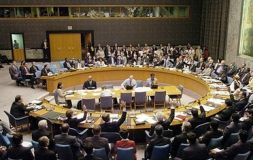UN oks control over Darfur peacekeepers
Aug 31, 2006 (UNITED NATIONS) — The U.N. Security Council passed a resolution Thursday that would give the United Nations authority over peacekeepers in Darfur as soon as Sudan’s government gives its consent — which it has so far refused to do.
 The resolution is meant to give more power and funding to a force, now run by the African Union, that has been unable to stop the humanitarian catastrophe in Darfur that has killed more than 200,000 people and continues to worsen.
The resolution is meant to give more power and funding to a force, now run by the African Union, that has been unable to stop the humanitarian catastrophe in Darfur that has killed more than 200,000 people and continues to worsen.
The document passed 12-0, with China, Russia and Qatar abstaining.
Yet the council cannot take any significant action on the resolution until Sudan reverses its opposition to a U.N. force. The United States and Britain, the two original sponsors of the resolution, said they hoped that the vote would help put new pressure on President Omar al-Bashir to acquiesce.
“It is imperative that we move immediately to implement it fully to stop the tragic events unfolding in Darfur,” U.S. Ambassador John Bolton said. “Every day we delay only adds to the suffering of the Sudanese people and extends the genocide.”
China and Russia said they supported the contents of the resolution but wanted Sudan’s consent before adopting it. By pushing ahead, China said, the council only risked triggering further violence in Darfur.
“This is obviously not the intended outcome of the council in adopting this resolution,” U.N. Ambassador Wang Guangya said.
In Washington, Assistant Secretary of State Jendayi E. Frazer said she was “absolutely confident” the Sudanese government would accept a U.N. peacekeeping force.
Frazer, who returned Wednesday from Khartoum and talks there with Sudan’s president and other senior officials, said she would call Foreign Minister Lam Akol to encourage him to come to Washington for talks “sooner rather than later.”
Sudan’s president had told her he would send an envoy in response to a message from President Bush requesting entry of the U.N. force into Darfur.
Kristen Silverberg, assistant secretary of state for international organizations, said “we are very pleased” with passage of the resolution.
At a joint news conference with Frazer, Silverberg called Russia’s abstention “inexplicable.”
More than 200,000 people have died in the remote Darfur region since 2003 when ethnic African tribes revolted against the Arab-led Khartoum government. The government is accused of unleashing Arab militiamen known as janjaweed who have been blamed for widespread atrocities.
A peace deal signed by the government and one of the ethnic African rebel groups operating in the region has had little effect.
U.N. officials and aid workers say the crisis has only deepened in recent months, with rape, killings and other attacks in Darfur at a new high.
One central element of the resolution would give the peacekeepers new power to intervene to protect civilians in Darfur. The current African Union force has had little authority to intervene to stop such attacks.
Peacekeeping authority for the Darfur mission would be in the hands of a separate U.N. force already deployed in Sudan’s south. That peacekeeping force, which now has about 10,000 troops, would be expanded to 17,000 military personnel and up to 3,300 civilian police to cover both areas.
The African Union has called for the U.N. to take control of the peacekeeping force, whose formal mandate expires on Sept. 30.
Al-Bashir has offered to send government troops to Darfur but Western nations insist that would not help.
In a new bid to win Sudan’s consent, the council has planned a high-level meeting for Sept. 8 to discuss the issue with Sudanese officials as well as representatives from the African Union, the Arab League and the Organization of the Islamic Conference.
The resolution is the first to refer to the “responsibility to protect” — a notion agreed to at a summit of world leaders a year ago, in which the international community vowed to intervene to protect civilians if their government could not.
“The test before the council today was whether it was prepared to act to mandate the resolution and assume its responsibilities to the people of Darfur,” Britain’s Deputy U.N. Ambassador Karen Pierce said. “The adoption of this resolution shows that it is.”
(AP/ST)
